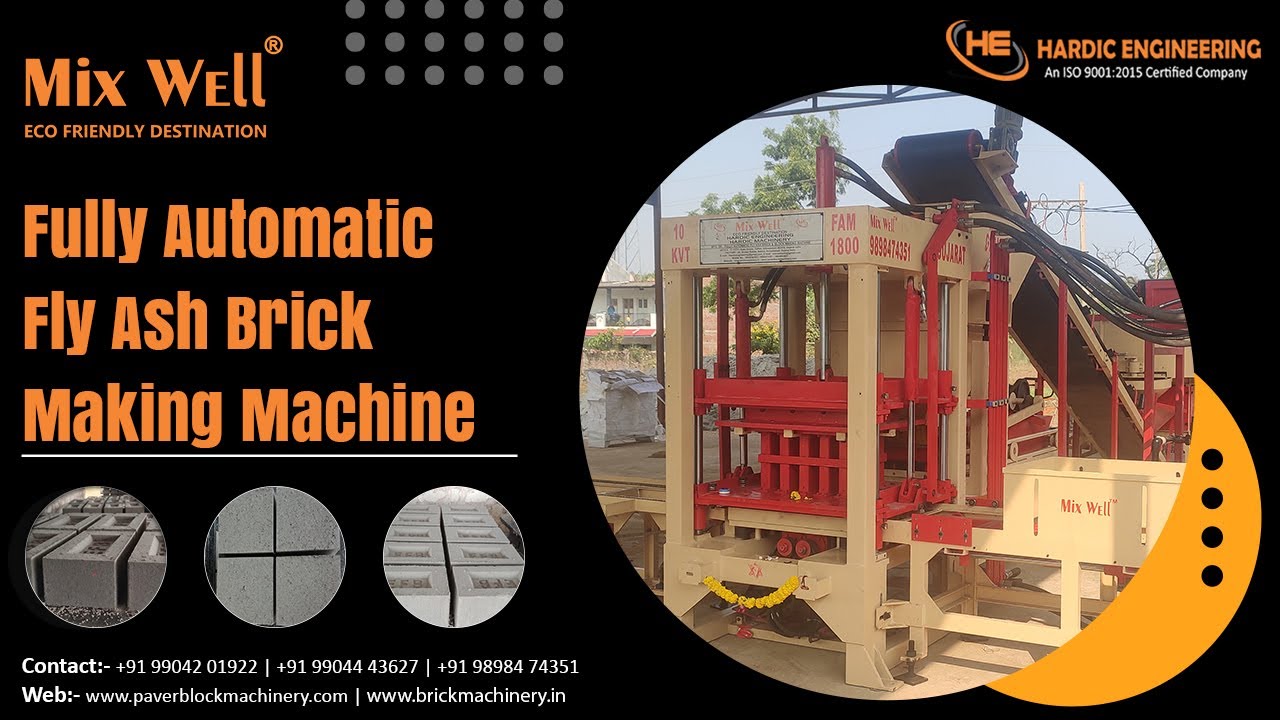
A Fully Automatic Fly Ash Brick Press Machine is a state-of-the-art hydraulic pressing system that manufactures bricks using fly ash, a by-product of coal combustion. These machines are engineered to perform high-capacity, labor-free production of bricks with consistency and durability.
Designed to suit commercial and industrial-scale brick manufacturing operations, these machines integrate raw material batching, mixing, pressing, and stacking operations into one seamless system. Due to increasing demand for sustainable and cost-efficient construction materials, these machines are becoming essential in the infrastructure and real estate industries.
Leading manufacturers of fully automatic fly ash brick press machines offer:
Customizable machine capacities
Precision hydraulic and vibration technology
PLC-based automation
Energy-efficient operations
Complete setup including raw material feeding, mixing, pressing, and curing
India is one of the leading producers of these machines, with manufacturing hubs in:
Ahmedabad, Gujarat
Coimbatore, Tamil Nadu
Morbi, Gujarat
Kolkata, West Bengal
Hyderabad, Telangana
Reva Engineering Enterprises
Laxmi Engineering Works
B & B Machines
Vortex Hydra
Himat Machine Tools
Neptune Industries Ltd.
Most top-tier manufacturers also provide turnkey project solutions, including layout planning, installation, and staff training.
Mass production of fly ash bricks for commercial and residential construction
Infrastructure projects (flyovers, highways, airports)
Government housing schemes (PMAY, EWS housing)
Institutional projects (schools, hospitals, hostels)
Raw Material Loading Fly ash, sand, cement/lime, gypsum are fed into hoppers.
Weighing and Batching Accurate batching system measures required proportions.
Mixing Planetary or pan mixers blend the materials into a homogenous mix.
Brick Pressing The mixture is conveyed into molds and pressed using hydraulic/vibratory force.
Curing Bricks are transferred to pallets for steam or water curing.
Stacking and Storage Cured bricks are automatically stacked and transported.
Solid Fly Ash Bricks
Hollow Fly Ash Bricks
Interlocking Bricks
Paver Blocks
Curbstones (in some machines with mold options)
Produces 10,000 to 30,000 bricks per shift, based on configuration
Ideal for meeting high-demand timelines for real estate and government projects
Fully automatic with PLC/SCADA integration
Requires only 46 operators per shift
Significant savings on labor costs
Hydraulic pressure (up to 200 tons) ensures:
High compressive strength
Uniform density
Accurate dimensions
Low water absorption
Interchangeable molds allow production of multiple brick/block types
Adjustable pressure and vibration settings for different materials
Fly ash utilization reduces environmental waste
Low carbon footprint compared to red bricks
Less water usage for manufacturing and curing
Reduces long-term manufacturing costs through automation
Low maintenance due to robust mechanical design
Energy-efficient hydraulic and motor systems
Machines adhere to BIS and ISO quality standards
Compliant with government policies for green construction
| Parameter | Specification Range |
|---|---|
| Production Capacity | 1,000 3,000 bricks/hour |
| Power Consumption | 25 HP 80 HP |
| Hydraulic Pressure | Up to 200 tons |
| Brick Size | 230x110x75 mm (customizable) |
| Cycle Time | 1020 seconds per cycle |
| Mold Changing Time | 2030 minutes |
| Machine Lifespan | 815 years (with regular maintenance) |
| Operation Mode | PLC-Controlled Fully Automatic |
A: Fully automatic machines automate the entire processfrom raw material feeding and mixing to pressing, curing, and stacking. Semi-automatic machines require manual intervention for feeding and stacking.
A: The typical raw materials include:
Fly ash
Cement or lime
Stone dust/sand
Gypsum
Water (for mixing and curing)
A: Typically, 4 to 6 operators are sufficient per shift for loading materials, overseeing machine function, and managing final product stacking.
A: The cost depends on capacity and automation level. Price range:
Entry-Level: ?2030 lakhs
Mid-Level: ?3050 lakhs
High-End Custom Models: ?50 lakhs ?1.5 crores
A: Fly ash bricks have:
Higher strength
Uniform shape and finish
Lower water absorption
Better thermal insulation
Greater earthquake and fire resistance
A: On average, it takes 4590 days to set up a fully automatic fly ash brick plant, including civil work, machinery installation, and training.
A: Yes, many state governments and MSME schemes provide:
1535% capital subsidy
Interest subsidies
Power tariff reductions
GST and tax incentives for eco-friendly units
A: Generally, bricks require 714 days of curing. With steam curing, the process can be reduced to 23 days.
A: Yes. By changing the mold, the same machine can produce:
Paver blocks
Hollow bricks
Curbstones
Interlocking blocks
A: Look for:
ISO 9001 Certification
BIS certification
CE marking (for export models)
Investing in a fully automatic fly ash brick press machine is a strategic step for construction businesses aiming for scalability, consistency, and sustainability. As India and other developing nations push for cleaner construction methods, these machines are set to play a pivotal role in shaping the future of infrastructure.
By partnering with a reliable manufacturer and choosing the right configuration, businesses can ensure high ROI, operational ease, and a significant contribution to green building practices.
Website :-https://mixwellbrickmachine.com/
Phone No.:-+91 99042 01922 / 9898474351
Gmail:- mixwellindia@gmail.com
Address:- Office Address
C-1, 77/1, Kaka Estate, Ambicanagar Road, Nr. National Plastic, Odhav, Ahmedabad 382415, Gujarat, India
Office Address
C-1, 77/1, Kaka Estate, Ambicanagar Road, Nr. National Plastic, Odhav, Ahmedabad β 382415, Gujarat, India.
Factroy Address
24, Shreeji Estate Near Sankalp Estate, Bakrol Cir, Ahmedabad-382430, Gujarat, India
mixwellindia@gmail.com
hardicengineering@gmail.com
+91 99042 01922
+91 98984 74351
Also Send Mail
© Hardic Engineering . All Rights Reserved.
